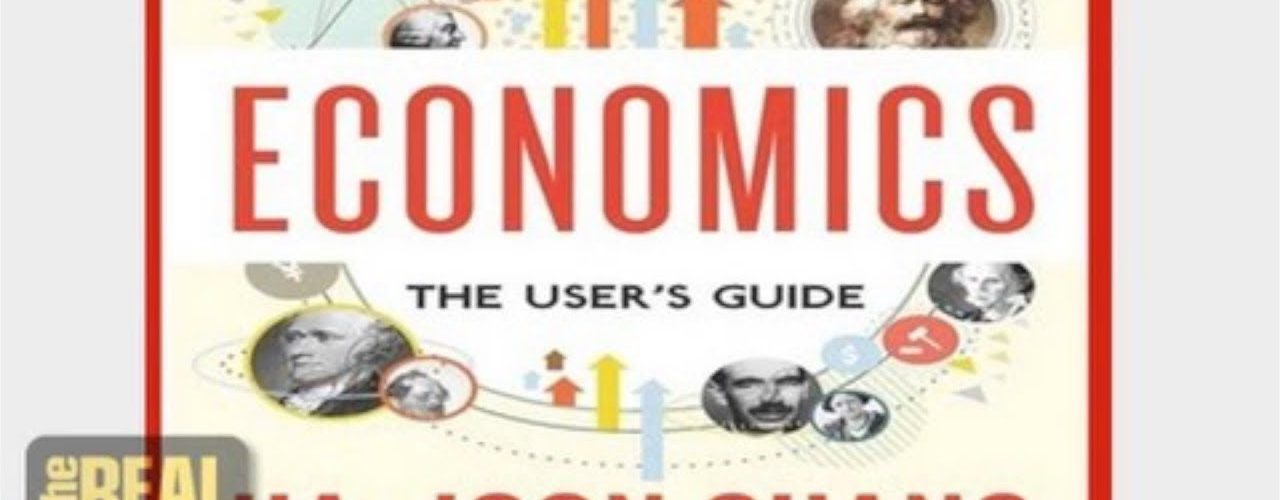The Keynesian, Schumpterian & Behavioralist Schools of Economics like the Marxian, Austrian & Institutionalist Schools and the Development Tradition are all alternative approaches to economics that each respectively can help us understand the whole economy in ways that would be missed under an exclusive focus on the Neoclassical approach.
May 15, 2015 Produced by Lynn Fries
TRANSCRIPT
LYNN FRIES, TRNN: Welcome to The Real News Network. I’m Lynn Fries, in Geneva.
This is Part 5 of a six-part series with economist Ha-Joon Chang. We’re exploring thoughts from his book Economics: The User’s Guide, where he critiques the narrow focus of today’s economics profession that recognizes one approach, the Neoclassical approach, as the right way of doing economics. In this segment, we’re continuing our look into respective strengths of many other, different approaches. Our guest, Ha-Joon Chang, joins us from the UK where he teaches economics at the University of Cambridge. Economics: The User’s Guide is his latest book. Earlier books include Kicking Away the Ladder, and 23 Things They Don’t Tell You About Capitalism.
Welcome, Ha-Joon.
HA-JOON CHANG, ECONOMIST, UNIV. OF CAMBRIDGE: Hi.
FRIES: We’re going to pick up where we left off in Part 4, where you talked about the Marxist, the Developmentalist, the Austrian, and the Institutionalist Schools. So now give us an example of a contribution from the Keynesian School. .
CHANG: The Keynesian School has two key differences from the Neoclassical School. The first difference is that the Keynesian School starts from the assumption that what is good for individuals is not necessarily good for the entire economy. The best example is that of, say, government deficits. You know, in the U.S., UK, in many European countries after the 2008 financial crisis, government deficits mushroomed because that economic collapse, and tax revenue wasn’t coming in, while the government had certain spending commitments.
Now, in order to solve this problem a lot of Neoclassical economists said we just have to cut spending, because government debt is a bad thing. Now, you can debate whether government debt is a bad thing or a good thing, but even assuming that it’s a bad thing, a Keynesian would say, well, even so you cannot cut government spending in the way that Neoclassical economists want it to be cut, because my spending is your income. If the government begins to cut its spending, someone else is losing income, and therefore that person also has to cut spending, and it gets into a downward spiral.
So what may be prudent for individuals, i.e. your income falls and therefore you need to reduce your spending, may not be actually a wise idea for the entire economy. Because if everyone, including the government, begins to cut spending the economy will get into a downward spiral. So that idea that what is rational for individuals may not be rational for the entire economy, that is one crucial difference between Neoclassical economics and the Keynesian School.
Another difference is that in Keynesian theory, money is at the center of the economic theory, whereas in Neoclassical economics it’s kind of a, an add-on. I mean, Neoclassical economic theory doesn’t need money to work, whereas in Keynesian theory, money and credit and debt–I mean, these are central to economic dynamics.
FRIES: The Schumpeterian School?
CHANG: Schumpeter’s theory of economics was very, very different from the Neoclassical theory. Now, in Neoclassical theory the ideal state of the economy is known as the state of perfect competition. This is referring to a market in which only very small producers exist and they fiercely compete with each other, but individually they are incapable of affecting the market outcome. So in that theoretical scheme, monopoly is actually a big enemy. I mean, many Neoclassical economists will call monopoly a market failure, and the government is justified to regulate prices or the rate of profit in monopolistic industries.
However, Schumpeter has a totally different view. He sees monopoly as an inevitable or even necessary feature of capitalism, in the good sense. Because in Schumpeter’s view, capitalism develops because people innovate. They come up with new technologies, new forms of organization, they open new markets. But when they innovate then they become monopolies. When you invent something that no one can imitate, at least in the short run, you can basically charge whatever you want for people who want to buy your product.
Of course, this doesn’t last forever. I mean, competitors come up, they undermine you, or completely new technologies that get invented, and they make you irrelevant. Just think about the way in which IBM and Kodak have become, well, basically specialized consulting companies. I mean, these companies whose names were at one point synonymous with computers and cameras, respectively, have now basically disappeared. So in Schumpeter’s view, that’s what makes capitalism dynamic, and therefore that monopoly is the natural phenomenon of a dynamic economy. Only that no monopoly lasts forever.
So in Schumpeterian view, this state of fierce (called perfect) competition, which the Neoclassical economists take as an ideal, is actually a state of stagnation rather than a good thing. So it’s a very different view of capitalism.
FRIES: The Behavioralist School?
CHANG: Now, the Behavioralist School starts from the observation that the human beings assumed in Neoclassical economics is really so totally unrealistic, it is–that assumption is really useless in helping us understand the world. I mean, the view of the Behavioralist School is that we actually need to understand the underlying cognitive processes of human beings. Understand how they think, how rational or irrational they can be, how emotional they can be, and how that affects what people do.
They argue basically that human beings are very complex and flawed, you know, we have multiple motivations, we have limited rationalities. And they built a whole theory about human behavior and organization and institutions eventually based on this assumption, which is totally different from the Neoclassical one, and it actually is much better at allowing us to understand, allowing us to understand how the real world works.
I mean, to go back to the example of the recent financial crisis, you know, if you really studied the Behavioralist approach carefully, you could have actually prevented a lot these problems in the financial sector. Unfortunately, policymakers are mainly informed by Neoclassical economics, and believe that these bankers really know how to take care of themselves, they are rational, they have their own self-interest and they wouldn’t deliberately do things that destroy themselves.
Unfortunately, these bankers like all other human beings are very complex and flawed characters, and they ended up making a lot of decisions which not only destroyed themselves but also destroyed the rest of the economy. So actually the insights from the behavioralist school are very important in helping us understand the world in a more realistic way.
FRIES: And there’s an emphasis in this approach that the market only accounts for a small part of the economy?
CHANG: Yes. Herbert Simon once made this observation that something like 80% of economic activities in the United States are actually not organized through the market. They are mainly organized through the internal directives of companies and sometimes by government directives, and only about 20% of economic activities are organized through the market. So he said, actually, that we keep talking about the market economy but it might be more accurate to call it the organization economy.
Now, this is a very important point, the fact that the market accounts for only about 20% of economic activities doesn’t mean that its importance is only 20%. Because you know, this is where different economic forces meet and compromises are worked out and competition is set afloat and so on. But the fact that we are ignoring the remaining 80%, especially what goes on inside a company, it means that we are actually trying to understand the whole economy by looking at only one part of the process.
So it’s like the parable of the blind men feeling an elephant, you know. I mean, you’re only touching the leg and you think an elephant is like a pillar. So in that sense it appears just looking at the market exchange process, you lose sight of many important aspects of our economic activities, of production, how people work in the production process, how internal hierarchy of companies are organized. So you need to get insights from the Behavioralist School, Institutionalist School, and even Marxist School who will tell you that inside companies in greater depth.
So I mean, this is one example of why actually you need the different schools to fully understand the economy.
FRIES: Let’s talk about that in the next segment and how to make economics better serve democracy. Please join us for Part 6, the concluding segment, of our conversation with Ha-Joon Chang. Ha-Joon Chang, thank you.
CHANG: Thank you.
FRIES: And thank you for joining us on The Real News Network.
END TRANSCRIPT
Ha-Joon Chang, a Korean native, has taught at the Faculty of Economics, University of Cambridge, since 1990. He has worked as a consultant for numerous international organizations, including various UN agencies, the World Bank, and the Asian Development Bank. A best selling author, his latest book is Economics: the User’s Guide. He has published 11 other books, including Kicking Away the Ladder, winner of the 2003 Myrdal Prize. In 2005, Ha-Joon Chang was awarded the 2005 Leontief Prize for Advancing the Frontiers of Economic Thought
Originally published at TRNN



